Attention Deficit Hyperactivity Disorder (ADHD) is a neurodevelopmental disorder characterized by inattention, hyperactivity, and impulsivity. It affects individuals of all ages, and the symptoms can interfere with daily life activities such as work, school, and social interactions. Managing ADHD can be challenging, and traditional treatment options, such as medication and behavioral therapy, may not work for everyone. This is where mind-body practices come in. In this article, we will explore how practices such as meditation, yoga, and tai chi can benefit individuals with ADHD and improve their quality of life.
What are Mind-Body Practices?
Mind-body practices are techniques or activities that help individuals regulate their physical and mental states by bringing awareness to their thoughts and bodily sensations. Examples of mind-body practices include mindfulness meditation, yoga, tai chi, and qi gong. These practices have been found to be effective in reducing symptoms of ADHD, such as hyperactivity, impulsivity, and inattention. The underlying mechanism is thought to be related to changes in brain function and neurotransmitter activity. Specifically, mind-body practices have been found to increase activity in the prefrontal cortex, a region of the brain responsible for executive functioning, attention, and emotional regulation. Additionally, these practices have been shown to increase the production of neurotransmitters such as dopamine and serotonin, which can help improve mood and cognition.
Benefits of Mind-Body Practices for ADHD
- Improved attention and focus: Mind-body practices like mindfulness meditation, yoga, and tai chi have been shown to improve attention and focus in individuals with ADHD. These practices help individuals to stay present and focused on the task at hand by training the mind to be more aware and alert.
- Reduced hyperactivity and impulsivity: Mind-body practices can also help to reduce hyperactivity and impulsivity in individuals with ADHD. Yoga, for example, can help to calm the nervous system and reduce feelings of restlessness and impulsivity.
- Reduced stress and anxiety: Many mind-body practices, such as meditation, yoga, and deep breathing, are known for their ability to reduce stress and anxiety. These practices can be especially beneficial for individuals with ADHD who often struggle with high levels of stress and anxiety.
- Improved mood and emotional regulation: Mind-body practices can also help to improve mood and emotional regulation in individuals with ADHD. Regular practice of these techniques can help to regulate emotions and promote feelings of calm and well-being.
- Enhanced overall well-being: In addition to the specific benefits listed above, mind-body practices can also enhance overall well-being for individuals with ADHD. These practices promote physical health, reduce stress, and improve mental clarity and focus, all of which contribute to an improved quality of life.
Mind-Body Practices for ADHD: A Closer Look
- Mindfulness Meditation: Mindfulness meditation involves paying attention to the present moment, accepting it without judgment, and calmly acknowledging and accepting one's feelings, thoughts, and bodily sensations. Studies have shown that mindfulness meditation can improve attention, working memory, and cognitive flexibility in individuals with ADHD.
- Yoga: Yoga is a physical and mental practice that combines physical postures, breathing techniques, and meditation or relaxation. Research suggests that practicing yoga can reduce symptoms of ADHD, including hyperactivity, impulsivity, and inattention, and improve cognitive functioning.
- Tai Chi: Tai Chi is a martial art that involves slow, gentle movements, meditation, and deep breathing. It has been shown to improve attention, self-control, and cognitive function in individuals with ADHD.
- Qigong: Qigong is a Chinese practice that combines physical postures, breathing techniques, and meditation or relaxation. It has been shown to improve cognitive function, attention, and self-control in individuals with ADHD.
- Other mind-body practices: Other mind-body practices that have been shown to be effective in managing ADHD symptoms include biofeedback and progressive muscle relaxation. Biofeedback involves using electronic devices to measure and monitor body functions such as heart rate, blood pressure, and muscle tension and learning to control these functions through relaxation techniques. Progressive muscle relaxation involves tensing and then relaxing specific muscle groups to reduce stress and anxiety.

Incorporating Mind-Body Practices into ADHD Treatment Plans
Incorporating mind-body practices into ADHD treatment plans can be an effective way to manage symptoms and improve overall well-being. It is essential to have an individualized treatment plan that takes into account each person's unique needs and preferences. Mind-body practices can complement other treatment approaches, such as medication and therapy.
To integrate mind-body practices into daily routines, individuals with ADHD can start by setting aside dedicated time for practice each day, whether that be 10 minutes of mindfulness meditation or a complete yoga session. It can be helpful to incorporate these practices into daily routines, such as practicing mindfulness during daily activities or doing yoga before bed. Additionally, seeking out classes or groups focused on mind-body practices can provide a supportive and motivating environment for practicing these techniques.
It is important to note that mind-body practices should not be used as a replacement for traditional ADHD treatments, such as medication or therapy. Instead, they can be used as a complementary approach to improve symptom management and overall well-being. It is essential to consult with a healthcare professional before starting any new treatment approach, including mind-body practices.
Overcoming Common Barriers
- Time constraints: Many individuals with ADHD have busy schedules, making it challenging to find time for mind-body practices. One way to overcome this barrier is to start with short sessions and gradually increase the length of the practice over time. Incorporating the practice into a daily routine, such as right before bed or after waking up, can also help make it more manageable.
- Physical limitations: Some individuals with ADHD may have physical limitations that make certain mind-body practices challenging. For example, individuals with joint pain or limited mobility may find yoga difficult. It is essential to work with a healthcare professional or experienced instructor to modify the practice to suit individual needs and abilities.
- Resistance to trying something new: Trying a new practice can be intimidating, especially for individuals with ADHD who may struggle with change. Starting with a small commitment, such as just a few minutes per day, can make it easier to overcome this resistance. It may also be helpful to focus on the potential benefits of the practice and set achievable goals.
- Cost and access to resources: Some mind-body practices, such as yoga classes or biofeedback sessions, can be costly. However, there are many free or low-cost resources available, such as online videos or apps. Additionally, some insurance plans may cover the cost of certain mind-body practices, so it may be worth exploring this option with a healthcare provider.
In conclusion, mind-body practices have shown promising results in helping individuals with ADHD manage their symptoms and improve their overall well-being. With benefits ranging from improved attention and focus to reduced stress and anxiety, these techniques offer a valuable addition to traditional ADHD treatment approaches. However, it is essential to address common barriers to practicing mind-body techniques and to develop an individualized treatment plan that incorporates a variety of strategies. By doing so, individuals with ADHD can experience the full benefits of a holistic approach to managing their symptoms. For those interested in exploring mind-body practices, there are many resources available, including classes, online tutorials, and mobile apps.

